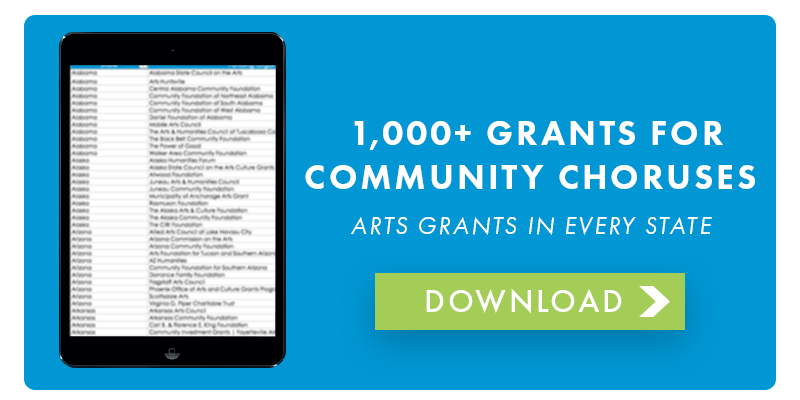
Community choruses often consider applying for grants as a way to bring in additional funding for their organization, but applying for grants can feel overwhelming at times. Here are some best practices for making sure you use your time wisely, apply for the right grants, and further your chorus's mission and goals.
Find a Volunteer & Delegate
Grant writing is no small feat. It's a time-consuming endeavor and one for which you will likely need help. Ask around the chorus to find a member with nonprofit or arts administration experience to help you with the grant research and application process. Any good writer or editor will do too!
Know Your Chorus's Mission
Before applying for grants, it is critical that you (and your new volunteer) understand your own organization's mission, purpose, and goals for the future. Take another look at your mission and decide what the key take-aways are. Does your chorus focus on innovative repertoire? Do you try to bring choral music to diverse communities? Is music education important to you? Using your mission to guide you through the process will help you narrow down grant opportunities, waste less time on applications that don't fit your mission, and stand out against other applicants.
Research Grants That Fit Your Choral Mission
There are a variety of grants available for community choruses but finding the right one can be a challenge. Use your mission's key takeaways in your search terms to find suitable grants. If your chorus prides itself on programming innovative repertoire, search specifically for "grants for innovative choral programming." Look for international, national, and local grant opportunities!
Staying organized with your grant research is key to success. If you find a grant that suits your chorus, place this information somewhere you can easily access it, enter the grant deadlines in your calendar, and share it with your board.
Read the Grant
Once you find a potential grant opportunity - read it thoroughly! Confirm that your chorus meets the eligibility requirements and criteria listed on the grant's informational page. Review the required supplementary materials and confirm that your organization can supply these.
Determine how closely the grant's mission aligns with your chorus's mission. If it seems like it would take a lot of explanation to tie the two missions together, it is likely not the right grant for you. Keep searching for the one that most aligns with your mission and/or specific project.
And finally, confirm that you can deliver what the grant requires you to deliver. This is important because you may be asked to provide additional information about the success of your project funded by the grant.
Before spending time applying for the grant, meet with your board to determine whether you can fulfill those requirements. Don't apply for a grant because your chorus needs funding. Apply for a grant because your organization is able to carry through with the criteria and requirements that the grant demands!
Writing the Grant

Always highlight your chorus's mission. Remember that it is unlikely that the board knows about your chorus, so make sure you tell them about your organization. Hopefully, you've chosen a grant opportunity that aligns with your mission, and the grant review board will be keen to know how your project will help further their own mission.
Demonstrate your fiscal responsibility by showing examples of how your chorus manages finances. If you've ever received a grant in the past, including details on how you managed the funds. You should also include a financial plan for how you want to use the grant money. Get specific! Show them that you have put effort and thought into the project plan.
Follow all instructions. This may seem obvious, but it's surprising how many people fail to do this. Do not omit any information that the grant requests.
Review, revise, and repeat until there are no errors, you've made sure that you have followed all instructions, and you've included all of the supplementary information. Print out the application for one final proof and to ensure that everything prints correctly.
Good luck!
Additional resources:
- Community Tool Box: 14. Writing a Grant Application for Funding
- wikiHow: How to Write a Grant Proposal
- Strategic Grants: Application Writing Examples
For more national, regional, and statewide grant opportunities, download our grants database for community choruses featuring over 1,000 grants!

Tori Cook is the former Director of Sales & Marketing at Chorus Connection, an active board member of the Greater Boston Choral Consortium, and a soprano with the Tanglewood Festival Chorus. In a past life, she was the Music Director of the Harborlight Show Chorus and President of Chorus pro-Musica. When not making music, she daydreams about adopting a golden retriever puppy and scuba diving to exotic locations around the world.


